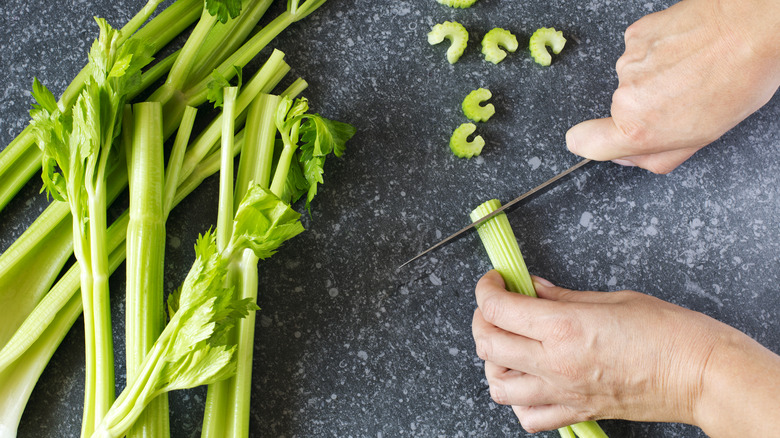
Certain food combinations are simply logical, much like oatmeal with nuts or steak paired with broccoli. They not only taste delightful together but also complement each other nutritionally. This is true for peanut butter and celery as well. Whether enjoyed as a party snack or a crunchy midday treat, they are a well-loved pair.
Consuming them together offers numerous benefits for your body. From a nutritional standpoint, a 5-inch raw celery stalk (17 grams) combined with two tablespoons of peanut butter (32 grams) can provide approximately 1.8 grams of total dietary fiber, 16.4 grams of fat, 7.3 grams of protein, and 7.6 grams of carbohydrates, according to the U.S. Department of Agriculture. You also receive other nutrients like niacin, manganese, copper, magnesium, vitamin B6, vitamin E, vitamin K, phosphorus, zinc, and folate.
Interestingly, celery (scientific name: Apium graveolens), believed to be native to the Mediterranean region, has been utilized as a medicinal plant since A.D. 1500, and it is part of the parsley family. Peanuts are thought to have originated in Peru or Brazil, South America. The nutrients and compounds in both foods can benefit gut health, weight loss, and sleep, and help maintain balanced blood sugar levels. Let’s explore further.
You could lose weight from this healthy pairing

Consuming foods that help you feel full longer is beneficial, especially when aiming to lose weight. Foods that provide lasting satiety reduce the chances of cravings or eating snacks that may not align with your weight goals, and also decrease the risk of overeating at main meals.
The combination of peanut butter and celery can assist in this area. One reason is their high fiber content. Fiber aids digestion and takes longer to digest, adding bulk to your digestive system, which keeps you satisfied. Additionally, the protein and fat in peanut butter and celery contribute nutrients that require more time to digest. Protein and fat are known to regulate hunger and satiating hormones, helping you feel full longer.
Don’t overlook celery’s high water content. A 5-inch stalk contains up to 16.2 grams of water, according to the U.S. Department of Agriculture. Foods rich in water not only keep you hydrated but can also aid weight loss due to their low-calorie density. However, be cautious of consuming too much peanut butter, as it is calorie-dense.
Your gut health may improve

Let’s explore how consuming peanut butter and celery can benefit your gut health.
Studies link peanut consumption to greater gut microbial diversity and an increase in “good” gut bacteria, promoting healthy liver metabolism, improved immune function, and better cognition and mood. Researchers attribute these benefits to the prebiotic fiber and polyphenols in peanuts. Nuts, including peanuts, contain prebiotic compounds that encourage the growth of beneficial gut bacteria, leading to positive gut health changes, as noted in a 2020 systematic review in the British Journal of Nutrition.
Celery also enhances gut health, thanks to its pectin-based polysaccharides and high fiber and water content. Polysaccharides protect against stomach ulcers, while water and fiber support digestion and regular bowel movements. Additionally, a 2021 study in the journal Food and Function found fermented celery juice effective in modulating gut microbiota to prevent obesity-related metabolic disorders.
Peanut butter and celery could help you sleep better

Snacking on celery sticks with peanut butter may improve sleep quality. Science points to the tryptophan content in peanut butter as one reason. Two tablespoons of peanut butter offer 74 milligrams of this amino acid, according to Real Simple. Tryptophan aids in the production of serotonin, a neurotransmitter involved in sleep regulation. Serotonin also helps produce melatonin, the “sleep hormone,” which signals your body when it’s time to sleep.
A 2019 study in Nutrients linked tryptophan-rich foods, like peanuts, with better sleep in athletes. Celery contains a compound called 3-n-butylphthalide (BuPh) (via MedicineNet) that relaxes the central nervous system. Additionally, avoiding waking up due to hunger can aid sleep, and peanut butter with celery helps by keeping you full longer.
Maintaining balanced blood sugar levels also supports better sleep. Both celery and peanut butter may aid blood sugar control. Celery’s apigenin and fiber contribute to this effect, while peanut butter’s low carb content paired with high fiber and protein helps. Besides celery, pairing bananas with peanut butter also offers benefits.




